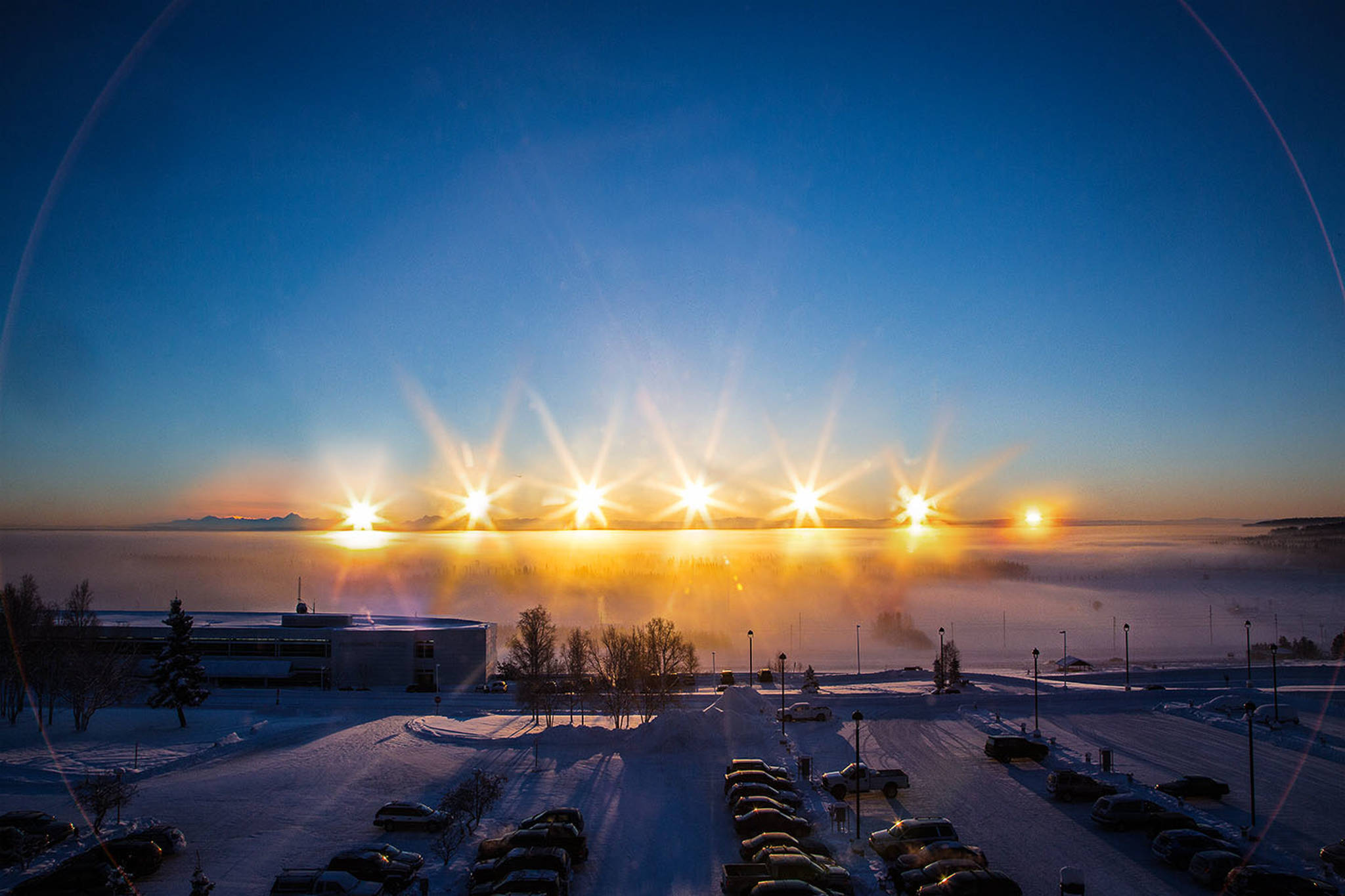By Ned Rozell
On Dec. 21 at 1:02 a.m. Alaska time, this big round head of a planet will tip back, pause, then slowly nod toward the sun.
That breathless moment of stillness is the northern hemisphere’s winter solstice.
Solstice is a combination of a few Latin words, meaning “sun stands still.” That is somewhat true from this far-north vantage point, as well as all over the world.
Unlike all the other days of winter, on Dec. 21 we will neither lose nor gain a second of sunlight here in middle Alaska. The sun arcing over the Alaska Range to the south will follow a path that is almost precisely the same as its track on Dec. 20.
If, from a perch on the university hill here in Fairbanks, you squinted at the sun for the 3 hours, 41 minutes it was visible those two days, you might guess that it was standing still.
However, after that day of “Time Stand Still” (a sweet Rush song penned by drummer Neal Peart, who died in January 2020), we in Fairbanks sip more sunlight each day. By Dec. 22, the sun is above the mountains for 20 additional seconds. Forty more the day after that. Another minute the day after that.
By New Year’s Day, we will experience more than four hours of possible sunlight.
[The big wheel keeps on turnin’]
January is also when we notice our coldest air, due to a lag from the time we receive the least solar radiation to when that absence manifests in frigid air temperatures. Last January, Fairbanks showed that the deep valleys of the North are still fantastic at shedding whatever heat they may have held. Our average temperature for the month was minus 21 degrees Fahrenheit.
Though solstice will soon pass, we are still dark and cold. But, as a friend said to me not long ago, “It all goes so fast.”
That friend, Dave Klein, died one month ago, at the age of 93. This solstice is the first since 1927 during which sunlight has no chance of brushing his lanky body as he strides out for a ski or swings his hatchet to make kindling.
Dave was one of many people we lost in 2020. I knew him for the last 20 years of his life. He was our neighbor most of that time, until the shoveling and the risk of falling was too much, and he moved to Raven Landing in Fairbanks. Before that, we passed many hours together drinking coffee, pulling down problem spruce trees with his 100-year-old block-and-tackle, and talking about muskrat pushups while we warmed up in the sauna he built.
Before I met him, Dave had retired as a biologist and ecologist at the University of Alaska Fairbanks. There, he had a joint position with the university and the U.S. Fish and Wildlife Service. He never really seemed retired to me.
Over the years, he helped so many graduate students earn their degrees they could fill an auditorium. Those men and women spent hours watching caribou and musk oxen and bison and other wild animals roam over Alaska. Those students are now decision-makers in Alaska and all over the world.
Along with that legacy, Dave left a nice example for aging with grace and happiness.
He always had a Science magazine open on his desk, his reading glasses resting on top. He sought out younger people to join him in adventures, such as skiing into his Quartz Lake cabin in the winter. And he kept that tall body moving, tending his small garden, burning brush and building chickadee nest boxes in the garage.
Since driving up the Alaska Highway in his Model A Ford in 1947, Dave had experienced more winter (and summer) solstices here than anyone else I knew. He came to the territory at a good time for a young man who was interested in Alaska mountains and the animals that live in them.
Those chickadees and Dall sheep and caribou are out there now, scratching at the quiet, muted landscape, using marvelous adaptations to survive in a place most creatures can’t. Dave did the same, for a long time. I will light a candle or two on Dec. 21.
• Since the late 1970s, the University of Alaska Fairbanks’ Geophysical Institute has provided this column free in cooperation with the UAF research community. Ned Rozell ned.rozell@alaska.edu is a science writer for the Geophysical Institute.

